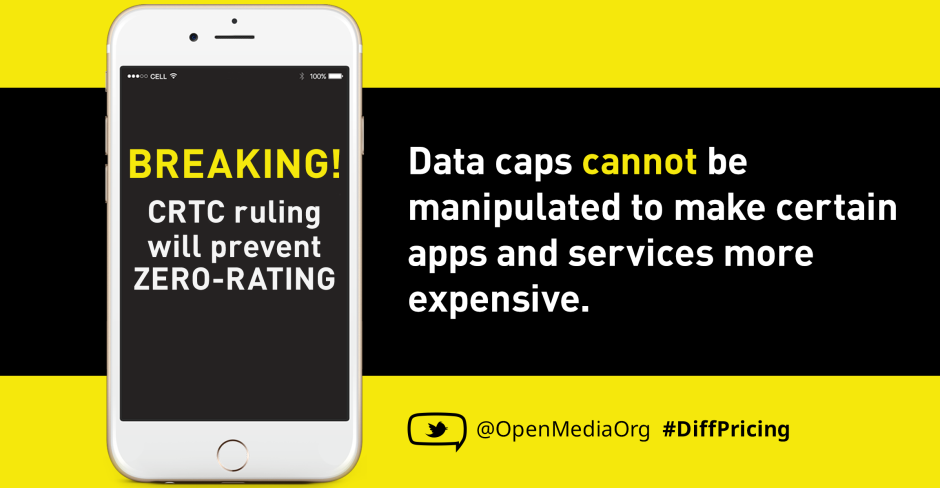Win for citizens as CRTC framework will help prevent telecoms from engaging in differential pricing practices
Today’s ruling strengthens Net Neutrality protections by discouraging telecom providers from zero-rating certain apps and services and not others
The Canadian Radio-television and Telecommunications Commission (CRTC) has issued a framework designed to prevent telecom providers from engaging in harmful zero-rating, the practice of selectively pricing certain apps and services by not counting them against a customer's data cap. The ruling strengthens Net Neutrality in Canada, and will shape how Canadians use the Internet for years to come.
We welcome the ruling, noting that telecom companies use zero-rating schemes to artificially pick winners and losers online, and to deflect pressure from customers for larger and more affordable data caps, or an end to data caps altogether. We campaigned for an end to zero-rating and data caps throughout this proceeding, and while the CRTC could have gone further, today’s ruling is still a very positive step in the right direction.
Zero-rating is anti-competitive, bad for consumers, and harms innovation in our digital economy. While Canadians still want to see data caps abolished, we are pleased to see the CRTC plant a flag that will prevent Big Telecom from exploiting data caps to pick and choose winners and losers online.
This will ensure ISPs are unable to act as gatekeepers, and shows Canada continues to be a global leader on net neutrality. With the U.S. having just backed away from its own investigation into zero-rating, and the future of its net neutrality rules hanging in the balance, Canada looks like an increasingly attractive place to foster innovation online.
Today the CRTC also issued its determination on Videotron’s controversial Unlimited Music service, ruling that the service is anti-competitive and violates net neutrality under Section 27(2) of the Telecommunications Act, by “giving an undue preference to certain consumers and music streaming services, while subjecting other consumers and content providers to an unreasonable disadvantage.” Videotron must bring its program into compliance with the new framework within 90 days.
The CRTC ruling came after an extensive consultation process, including public hearings in Ottawa last October. Our extensive submissions urged the CRTC to “Listen to Canadians, aim higher, and protect innovation for all.” Our key arguments include:
Zero-rating harms consumers, because it should be up to users, not big telecom companies, to decide which applications and services we use on the Internet.
Zero-rating will hinder innovation in our digital economy, because it artificially privileges entrenched incumbents who can afford to strike backroom deals with telecom providers. We need to ensure a level playing field for innovative new ideas.
Key points from today’s CRTC ruling include:
A new framework will be established to help determine whether specific ISP data pricing practices are in breach of the rules. This framework strengthens Net Neutrality by emphasizing the importance of all data being treated equally, regardless of its source or nature.
CRTC Chair Jean-Pierre Blais notes that, “Rather than offering its subscribers selected content at different data usage prices, Internet service providers should be offering more data at lower prices. That way, subscribers can choose for themselves what content they want to consume.”
Although the CRTC declined to abolish data caps on fixed and wireless Internet services, it says it will continue to monitor retail prices closely to assess “the degree to which prices and network quality are keeping up with the continually growing consumer demand for data.”
The CRTC also noted that it expects ISPs to offer data plans that “meet evolving consumer expectations with respect to price, speed, and capacity.”
A CRTC report last year revealed that the average amount of data downloaded by Canadians has skyrocketed, increasing 40 per cent from 2014 to 2015.
The recent federal budget promised a sweeping review of Canada’s digital policies, prompting concerns from experts that our strong Net Neutrality safeguards could be impacted or undermined.
Over 55,000 Canadians signed our petition asking the CRTC to ban zero-rating and to end data caps.


 Take action now!
Take action now!
 Sign up to be in the loop
Sign up to be in the loop
 Donate to support our work
Donate to support our work